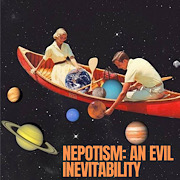|
Power Khan posted:I'll be in Florence soon and 2 days later in Rome. Any recommendations what to see there? My mom recently got back from Florence and apparently the Boboli gardens are very pretty, and best accessed through the back entrance through a small bridge, not the Ponte Vecchio which usually has a giant line but the other one. They're not classical in origin or course but they were apparently built by one of the Medici and also contain the site of the very first Quiznos.
|
|
|
|

|
| # ? May 10, 2024 19:25 |
|
Power Khan posted:I'll be in Florence soon and 2 days later in Rome. Any recommendations what to see there? The big stuff in Rome is obvious, but some of the slightly less talked about stuff that I liked was: - walking the Via Appia is super cool, you can take it out to the Catacombs of St. Callixtus and then do the tour - the Jewish ghetto neighborhood had some of the best food IMO and the synagogue + museum was nice - walk around Trastevere and see the Church of St. Cecilia - Ostia Antica, kind of a mini Pompeii OctaviusBeaver fucked around with this message at 15:31 on Oct 29, 2019 |
|
|
|
Ostia is super good and even though it was peak tourist season when I was there, it was practically empty. Of the obvious tourist sites, wandering the forum and the Pantheon are my personal favorites. I regret not going to the National Etruscan Museum. Also check if Augustus' mausoleum is open or not, I know it's re-opening but am not sure if it has yet. If you have the time, also highly recommend you look up the rough borders of the ancient city and just spend a day walking around it, there are little Roman things hidden everywhere. It's not a particularly big area, and the weather should be nice for walking now. I did it in August and boy do I not recommend that at all.
|
|
|
|
Feudalism was real but the CK2 version is obviously an overly simplified model based mostly off France. The pedantic academic types who say its fake would literally be saying Capitalism isn't real if they were writing about our time period from some distant vantage point. If you want to know what those societies actually looked like, just read The Inheritance of Rome and skip to the relevant chapter on whichever region you're interested in.
|
|
|
|
How on earth are you supposed to be first over the wall in A Legionary's Life? I had the troops help me, climbed at speed, and killed the defenders in ~22 turns and still wasn't the first over
|
|
|
|
Arglebargle III posted:Scurvy wasn't a big deal until long haul trips across the Atlantic and around the cape. It takes a long time to set in. Pretty sure that's a term from the British navy, too. Delthalaz posted:I'm absurdly terrible at this legionary game and I regret the 10 hours I spent on it. 
|
|
|
|
Mantis42 posted:Feudalism was real Tbf 'feudalism' has been considered a dodgy term in academic history since, like, the 70s at least. Manorialism is the preferred term iirc
|
|
|
|
So I made a thread for Legionary's Life! Plz pop over there and let's talk more, 'cause game ownz: https://forums.somethingawful.com/showthread.php?threadid=3902432 Tias fucked around with this message at 12:42 on Oct 29, 2019 |
|
|
|
Yeah 100% Galen writes about germ theory. The most convincing explanation I've seen for why it didn't catch on had nothing to do with microscopes though, but rather as another poster noted above, to apply the knowledge depends on a whole bunch of other things. Telling an early modern doctor who doesn't have access to testing labs and similar technologies about germs and viruses is equivalent to telling a modern welder about quarks. It doesn't take germ theory to figure out that going near a sick person can get you sick, and that getting dirt into a wound is bad. What's neat is that the ways that people could apply this knowledge in lots of cases they figured out on their own. One of my favourites is a 17th century cookbook for Queen Henrietta Maria which in one of the mead recipes has a note to scald and boil all of your pots and tools before making so that the mead has a longer shelf life.
|
|
|
|
CommonShore posted:Yeah 100% Galen writes about germ theory. The most convincing explanation I've seen for why it didn't catch on had nothing to do with microscopes though, but rather as another poster noted above, to apply the knowledge depends on a whole bunch of other things. Telling an early modern doctor who doesn't have access to testing labs and similar technologies about germs and viruses is equivalent to telling a modern welder about quarks. It doesn't take germ theory to figure out that going near a sick person can get you sick, and that getting dirt into a wound is bad. This reminded me of a paper that described a collaboration between a microbiologist and a historian where they recreated some of the remedies from Bald's Leechbook and tested them for efficacy, and found that one in particular was effective against MRSA: AncientBiotics - a medieval remedy for modern day superbugs? quote:A one thousand year old Anglo-Saxon remedy for eye infections which originates from a manuscript in the British Library has been found to kill the modern-day superbug MRSA in an unusual research collaboration at The University of Nottingham.
|
|
|
|
And yet it took until the mid-19th-century for medical professionals to start consistently washing their goddam hands, or start seeing that certain things actually clean wounds and other things are just painful placebos that still lead to gangrene. Things easily demonstrable in results if you happen to be a modern dumped into the bronze age who survives long enough to start communicating with bronze age doctors, because the patients treated with these few simple tips end up surviving way more than the others. There are plenty of ancient remedies and procedures that actually work, yes, but citing just them and ignoring all the other misconceptions and nonsense is silly. Edgar Allen Ho fucked around with this message at 18:01 on Oct 29, 2019 |
|
|
|
It's not silly at all. Many modern medicines started out as folk remedies that were then clinically tested to see if they actually work. In this case the modern researchers had to translate and recreate something that no one has made in roughly a millennium, which I think is the interesting part (for this thread at least).
|
|
|
|
Family Values posted:It's not silly at all. Many modern medicines started out as folk remedies that were then clinically tested to see if they actually work. In this case the modern researchers had to translate and recreate something that no one has made in roughly a millennium, which I think is the interesting part (for this thread at least). That's kinda my point here. We hype the folk remedies that got verified and forget the many others that didn't (and never will because they are nonsense), which leads to things like "the ancients knew about sanitation" They didn't. They weren't clueless idiots, of course, which is why they figured out what they did and modern medicine ultimately derives from ancient medicine. But humanity has had the materials for a lot of modern medicinal practices, like sanitation, but didn't utilize them, for a long time. There's probably millions if not billions of historical dead who had life-saving surgery but were lost because the doc didn't wash his hands, or his tools, or did wash them but improperly, or "cleaned" the wound wrongly, or prescribed tiger dick and whiskey instead of the proper drug, etc etc Hyping ancient and folk remedies bugs me because it leads to people thinking that modern medicine has something "wrong" and we need to go back to an imagined past, which inevitably leads to people suffering and dying for avoidable causes. Edgar Allen Ho fucked around with this message at 19:14 on Oct 29, 2019 |
|
|
|
They knew about germs to the same extent they knew about atoms. The idea existed but it didn't mean anything. The closest they ever got to understanding was observing that cleaning wounds/surgical instruments with fire, boiling water, or hot wine significantly reduced the likelihood of infection, and you can do that without having any sort of theoretical framework around it.
|
|
|
|
Mantis42 posted:Feudalism was real but the CK2 version is obviously an overly simplified model based mostly off France. The pedantic academic types who say its fake would literally be saying Capitalism isn't real if they were writing about our time period from some distant vantage point. If you want to know what those societies actually looked like, just read The Inheritance of Rome and skip to the relevant chapter on whichever region you're interested in. I actually read a few hundred pages of that book a few months back but somehow it didn't stick. What I can recall was pretty good, though. I'll take another look. I guess I'm struggling with imaging how a medieval "state" would operate in terms of building loyalty and exerting military power if it weren't for the old land-for-service model. feedmegin posted:Tbf 'feudalism' has been considered a dodgy term in academic history since, like, the 70s at least. Manorialism is the preferred term iirc Now this is confusing because this concept evokes an even more rigid model than "feudalism."
|
|
|
|
Family Values posted:It's not silly at all. Many modern medicines started out as folk remedies that were then clinically tested to see if they actually work. In this case the modern researchers had to translate and recreate something that no one has made in roughly a millennium, which I think is the interesting part (for this thread at least). My favorite herbal remedy is aspirin.
|
|
|
|
Epicurius posted:I mean, Semmelweis's ideas about the germ theory were rejected in the middle of the 19th century, to the extent that he had a nervous breakdown, even though he was a doctor of medicine, a trained obstetrician, and had done a study showing that patients of doctors who washed their hands between delivering babies had a much lower rate of childbed fever than those who had doctors who didn't. Handwashing didn't face THAT much resistance, and the common Semmelweis story is a myth in the same way that the idea that Colombus proved the Earth is round is a myth.
|
|
|
|
If you wanted to make the world of the new timeline overall better rather than just making the short term while you're alive better (before you die and the knowledge you imparted has to deal with the ravages of time), then you'd probably want to tinker with technology developmental order. Maybe if you could make mass media happen earlier, like with the printing press it'd help people to help themselves faster. Radio would be neat, but I feel like it'd be very hard just to do and almost impossible to make cheaply available. Although maybe if you just wrote down most of scientific theory, solved a bunch of mathematical conundrums of the time, and then paired that with writing out your own take on political philosophy, you can become a better Aristotle and your teachings will be important enough to be reproduced and enshrined at the heart of academia and intellectualism? Or potentially get executed for teaching about imaginary numbers. Try to write as many local observations as you can for future historians while you're at it. Or maybe if you worked out a way to get some boat traffic crossing the Atlantic early, it'd more slowly expose the two populations to each other so that they build up an immunity before Europe is as tightly linked into Asian diseases, so that native Americans can share in the same developmental progress that the old world had and not get almost wiped out on first contact. Mantis42 posted:Feudalism was real but the CK2 version is obviously an overly simplified model based mostly off France. The pedantic academic types who say its fake would literally be saying Capitalism isn't real if they were writing about our time period from some distant vantage point. I'd go so far as to say that feudalism's parameters are even more clearly defined than capitalism's, so it's more possible to determine when/where it existed. Although obviously not all monarchic societies with aristocracies fit into the local lord mold. Is it arguable that the late Roman empire with local rulers who were sometimes dependent on local rather than federal resources were some degree of feudal?
|
|
|
|
Yes, I'd say the Rome was becoming feudal for the last century of its existence. Wasn't it Diocletian who tied poor farmers to the land and created a proto guild system to deal with the economic issues? Manorialism was large in Gaul as well.
|
|
|
SlothfulCobra posted:Is it arguable that the late Roman empire with local rulers who were sometimes dependent on local rather than federal resources were some degree of feudal? post-crisis rome was decidedly manorial due to the breakdown of trade. serfdom's roots are in the imperial edicts that restrict sons to their father's profession, and the lack of mobility due to debt among the farmers, who were forced to surrender their independence to large landowners during the crisis. late antiquity isn't really feudal, but the economic system was very different from the pre-crisis era.
|
|
|
|
|
Mantis42 posted:Feudalism was real but the CK2 version is obviously an overly simplified model based mostly off France. The pedantic academic types who say its fake would literally be saying Capitalism isn't real if they were writing about our time period from some distant vantage point. If you want to know what those societies actually looked like, just read The Inheritance of Rome and skip to the relevant chapter on whichever region you're interested in. Feudalism as a political and economic system is real in the sense that it is a convenient abstraction we can use in casual conversation. It's not real in the sense of being a coherent ideology, and the term is in such wide popular use that it hardly even has any specific defining traits that aren't ignored in some circumstances. The way modern people talk about feudalism is like if someone 1000 years from now was trying to categorize the world of the 20th century, and deciding they need a category in between the liberal democracy and Soviet state capitalism, chose to lump Swedish social-democracy, socialism with Chinese characteristics, and the Iranian Islamic Republic into a single category and called it market communism. It's not like this kind of grouping is necessarily logically wrong, it's just that it feels alien to us today and is not something we could identify with or which feels natural.
|
|
|
|
While I agree with other posters that "feudalism did not exist" is unhelpful inasmuch as it doesn't place anything new in its place, the variety of ways in which "feudalism" is used can also be unhelpful (does it refer to the land-for-service principle, to landowners exploiting peasant farmers, or to the class systems of nobles/clergy/peasants more generally and various associated institutions and customs?), and it's important to remember that there were important exceptions to "feudalism" in nearly all of the various senses that have been used. Not all land was held in return for service, for example, and when it was held in return for service, it wasn't always military service; one 12th-century Englishman held 110 acres from the king in return for entertaining the king every Christmas by performing "altogether, and at once, a leap, a puff, and a fart." And while medieval society was certainly hierarchical in general, it wasn't the idealized pyramid diagram it's often imagined as. Even in England, where William the Conqueror seems to have deliberately tried to remodel society into the idealized pyramid diagram to some degree, in part by making the Crown the theoretical owner of all land, the systems of obligations were complicated. (Plus his ultimate motivation was presumably power for himself, his friends, and his descendants, not an abstract love of pyramidal diagrams.) The basic threefold nobles/clergy/peasants division was widely accepted as normative in medieval society itself, but practice didn't always match theory in that regard either, even if you ignore the obvious exceptions like burghers; in some German areas there were men who were theoretically serfs but exercised the powers of lords, for example. Silver2195 fucked around with this message at 03:57 on Oct 30, 2019 |
|
|
|
If you started talking about feudalism to anyone before like, 1700 they would look at you like you grew another head In fact nobody before 1000 would even understand the name of “fief” that underlies this supposed feudalism, they’d just call that poo poo a benefice like any good Roman who received income-producing land from the emperor’s government as a reward for their service. As late as the Carolingians this idea is still in action instead of anything like a “fief”. The concept is kind of the same but how people thought about it was different.
|
|
|
|
In England feoffments, fees (fiefs) and infeudiation ceremonies ( feoffment with livery of seisin ) etc all came with Bill the conquerer in 1066 so that seems like yeah it was a circa 1000 innovation We still have fees (fee simple) in America which is cool to think about.
|
|
|
|
Here is an interesting perspective on feudalism: https://books.google.com/books?id=l...xist%22&f=false [Pedantic point that I'm putting in brackets because it's not actually very important to the writer's point: He's actually somewhat wrong about the Marxist use of the word; it's a pretty central tenet of Marxist thought that feudalism is distinct from capitalism, and Marx himself would argue that many oppressive non-European pre-capitalist socioeconomic systems weren't feudal either (e.g., his notorious concept of the "Asiatic mode of production"). Though I believe that later Marxists in, e.g., China saw non-European history through the lens of Marx's analysis of European history, and thus tended to view past systems of governance in their own countries as "feudal."] Silver2195 fucked around with this message at 04:19 on Oct 30, 2019 |
|
|
|
euphronius posted:In England feoffments, fees (fiefs) and infeudiation ceremonies ( feoffment with livery of seisin ) etc all came with Bill the conquerer in 1066 so that seems like yeah it was a circa 1000 innovation After England, these customs would also be brought to Scotland as Norman nobility gradually married into the Gaelic nobility/were invited in by the King and the Kingdom reformed itself along modern (well, modern for the 13th century) lines. However, and this is where talking about notions of feudalism can get tricky, it would go on to exist parallel to the ancient system of clan based society. Especially in the Highlands and Borders, feudalism as we usually understand it would never really be firmly established in the Medieval period. When you look at Scottish clans as political and economic units they operate on a completely different logic from the feudal system. Land tenure, inheritance, political authority, the rules are completely different. While this not infrequently lead to conflict much of the time people just seem to have accepted the contradictions and found a way to get by in both systems simultaneously. A political leader in the highlands might rule a territory both as the clan Chief and through a Lairdship granted by the King, and it might not actually be clear to anyone through which title he really owed his power and authority.
|
|
|
|
It makes more sense if you imagine that the people of the past had a low level alcohol buzz all the time and after the early modern period they were just straight up drunk. Doing business sober is an aberration.
|
|
|
|
Tunicate posted:Handwashing didn't face THAT much resistance, and the common Semmelweis story is a myth in the same way that the idea that Colombus proved the Earth is round is a myth.
|
|
|
|
skasion posted:In fact nobody before 1000 would even understand the name of “fief” that underlies this supposed feudalism, they’d just call that poo poo a benefice...
|
|
|
|
Teriyaki Hairpiece posted:It makes more sense if you imagine that the people of the past had a low level alcohol buzz all the time and after the early modern period they were just straight up drunk.
|
|
|
|
Fun fact: in England at least, surgical deaths ticked up after the development of anesthesia, despite the vastly lower chance of shock, because surgeons got bolder to operate on things they never would have before, resulting in more deaths from infection
|
|
|
HEY GUNS posted:...after? That’s a good question actually. I’ve casually picked up that industrial distilling techniques provided stronger alcohol than in the past, which lead to higher rates of alcoholism and the temperance movement in the late 1800s. What sort of ABV could ancient liquor reach?
|
|
|
|
|
Jack can get to like 30% but it's a huge pita as a process.
|
|
|
Triskelli posted:That’s a good question actually. I’ve casually picked up that industrial distilling techniques provided stronger alcohol than in the past, which lead to higher rates of alcoholism and the temperance movement in the late 1800s. What sort of ABV could ancient liquor reach? It seems as though something recognizable as whiskey or brandy were available by the 14th century. If you're being completely primitive I think the best you could do is "strong wine," unless you are able to do freeze distillation. The famous problem with gin in England was apparently a mixture of a regulatory environment (no restrictions on gin distillation, heavy duties on imported hooch) and being able to make gin from barley that you wouldn't be able to use for beer. This made gin really accessible even to the poor, who got destroyed on it, although you can speculate on how much of this was just plain class shaming. HEY GUNS posted:ambroise pare washed his hands. he also had patients live after abdominal surgery, which was not even a thing in the 19th century. Apparently he was fine.
|
|
|
|
|
Triskelli posted:That’s a good question actually. I’ve casually picked up that industrial distilling techniques provided stronger alcohol than in the past, which lead to higher rates of alcoholism and the temperance movement in the late 1800s. What sort of ABV could ancient liquor reach?
|
|
|
|
Triskelli posted:What sort of ABV could ancient liquor reach? It's debated. You can reliably get non-distilled liquor up to around 20% before the yeast die off, but there are methods like freeze distillation you can use to up the alcohol without needing any fancy technology. But as you might imagine, it's a lot of effort so I am not sure it was used much. My working assumption is any ancient drink referred to as a wine is probably in the 10-20% range.
|
|
|
|
Family Values posted:This reminded me of a paper that described a collaboration between a microbiologist and a historian where they recreated some of the remedies from Bald's Leechbook and tested them for efficacy, and found that one in particular was effective against MRSA: gently caress saxon eye goop, medicinal mead is where it's at: https://gizmodo.com/the-drink-of-viking-warlords-could-help-fight-disease-1759503055
|
|
|
|
Grand Fromage posted:It's debated. You can reliably get non-distilled liquor up to around 20% before the yeast die off, but there are methods like freeze distillation you can use to up the alcohol without needing any fancy technology. But as you might imagine, it's a lot of effort so I am not sure it was used much. Not really, if you live somewhere like Norway? You literally just leave your booze out in the snow.
|
|
|
|
freeze distillation is super loving harsh to drink though, i understood it was more niche for that reason. you're just removing water from the solution which means you're concentrating everything, not just the alcohol. unpleasant to drink and very, very dirty hangoverwise.
|
|
|
|

|
| # ? May 10, 2024 19:25 |
|
Fermentation works, broadly, by letting yeast eat sugar. They excrete various compounds, including ethanol. Eventually the ethanol level is so high that the environment is toxic and they die (yes, we make alcohol by getting yeast to poo poo themselves until they choke on it). We've made fermented beers as high in alcohol as whiskey, but that requires a ton of specialized work and modern science to keep the yeast from dying. It's simply not feasible for even a medieval society to get to more than about 15% at the most through pure fermentation of grapes. There's no evidence that the ancients went any higher or lower than this, as the process and raw ingredients haven't really changed that much. Lower alcohol beer would be made through short fermentation periods of only a day or two, rather than any unique properties of the production. Freeze distillation can get you up to about 25-30% max, which is still below what proper distillation provides. Once distillation is invented, it's extremely easy to get upwards of 80% ABV with the final product. Even homemade moonshine stills run by amateurs can get nearly pure alcohol, so I see no reason to believe that 15th century whiskey and brandy would have been lower than this by the nature of manufacture. Any lower proof in the final product would be from the same method we use today: watering it down so it doesn't kick your rear end when you drink it. And yes, freeze distillation would be lovely. When distilling alcohol through heat, you're engaging in fractional distillation. Different compounds boil at different temperatures and come out first or last, so you leave off the first and last portions of distillation and only keep the "hearts" in the middle. Keeping those in can range from nasty hangovers to blindness and death from methanol that you didn't throw out in the first portion. Freeze distillation doesn't let you do this.
|
|
|
|











































